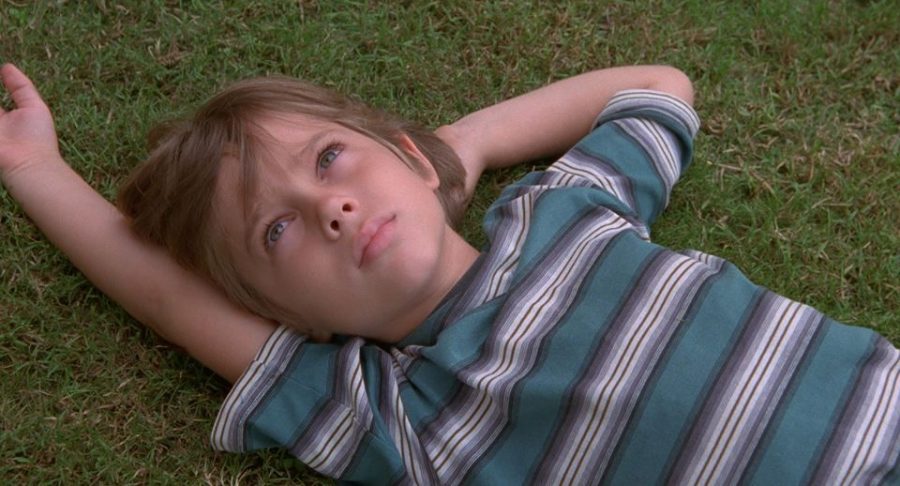Welcome Back: ‘Boyhood’ Linklater’s most stunning and ambitious masterpiece
August 19, 2014
“Boyhood”
Directed by: Richard Linklater
Starring: Ellar Coltrane, Patricia Arquette, Ethan Hawke, Lorelei Linklater
Grade: A
There are great movies, and then there are vital works of cinema — artifacts so entrenched in a time and place that they breathe new life into them, while changing the rules for what the medium can accomplish. Richard Linklater’s “Boyhood” triumphantly falls into the latter category.
With a few masterpieces already under his belt, Linklater filmed his latest and most ambitious one alongside a bulk of his filmography over a 12-year period. In 2002, he cast a 5-year-old boy (Ellar Coltrane) to play Mason and essentially grow up on camera with the character. Instead of a child-star meltdown, though, Linklater was able to get a spellbinding performance out of Coltrane, along with some awards-caliber work from Patricia Arquette and Ethan Hawke as Mason’s parents, Olivia and Mason Sr.
Though the premise sounds like Michael Apted’s “Up Series” documentaries — a series of documentary films that follow the lives of 14 British children — distilled down to a nearly three-hour feature, this one’s all scripted — and all the better for it. In spite of the scripted dialogue, there’s hardly a traditional narrative structure: Linklater presents a series of chronological vignettes. He nails every universal experience of being young, including backseat play-fights, throwing your sibling under the bus and downloading naughty pictures on your laptop. Much like life itself, these fragments don’t always provide closure, even if some significantly impact the film’s trajectory.
Linklater briskly moves through time, utilizing specific cultural, musical and political landmarks to ground Mason’s growth. Watching the movie in 2014, it’s natural to feel nostalgic when Mason watches “Dragon Ball Z,” plays his Game Boy Advance SP or treks through the “Oregon Trail” on a school computer, but they’re organic moments captured in the specific period, not strained efforts to recall what the kids were doing back in the early 2000s.
The soundtrack takes on a similar effect, using popular songs by Coldplay, Phoenix, Gotye and Wilco to announce a new year. Instead of flashing “2009” at the bottom of the screen, Linklater cues up “1901” by Phoenix to clue attentive music fans in on the progression of time. While “Boyhood” may not strive to achieve the indie cred of a Zach Braff soundtrack, Linklater more than compensates with deft control of the calendar.
The time lapses can be jarring because characters change hairstyles and vocal pitch in a matter of seconds, but isn’t that how a child’s growth can seem to a parent? Much like Olivia, we may be so distracted by putting food on the table, finishing up a degree with night classes and keeping our own heads on straight, that the transformation right in front of us can be so fleeting, so sudden, that we’re left wondering how we got here — or, as Mason’s mother laments late in the film, just before her son leaves for college, “I thought there’d be more.”
It’s certainly a coming-of-age tale for Mason and his sister Sam (Lorelei Linklater), but it’s just as much of a coming-of-age tale for their parents, too. Arquette and Hawke age almost as noticeably as Coltrane and Linklater during the film, and their characters mature all the same. In the beginning, Olivia is the oldest student in her college psychology class, but she becomes a well-respected and dignified professor years later — all while raising two kids and enduring several unhealthy relationships. Mason’s father reluctantly gives in to the white-collar world, trading his dubious career as an aspiring musician for a boring insurance gig, because life costs money. The shouting matches of their 30s turn into quiet admiration and civility in their 40s.
Mason’s parents suggest that we may never truly “come of age,” despite the majority of physical growth and identity-molding that Mason experiences throughout “Boyhood.” Eventually, we long for the stability and normalcy of a family. But Linklater exposes the folly in those expectations, yanking out the rug from underneath Mason, Sam and their mother nearly every time they settle down. New jobs, new cities and new marriages constantly whip us around in different directions, but sometimes that can be vital for our survival.
“Boyhood” has no true precedent in Linklater’s oeuvre, or in the history of film, but its closest cousin wouldn’t be his masterful coming-of-age snapshot, “Dazed and Confused,” his charming family comedy “School of Rock” or even the “Before” trilogy, but 2001’s “Waking Life” — his animated film that wrapped just before “Boyhood” began production. Both films are structured around a series of vignettes with little narrative cohesion and look to tackle the “big” questions in life, such as when Mason asks his father late in the movie, “What’s the point of all this?” But while “Waking Life” sought to provide a cluster of possible theories and answers to that question, “Boyhood” understands that sometimes it’s best not to reach for that gratification and simply live.



